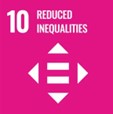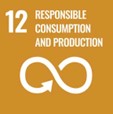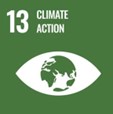2023 to 2024 Departmental Sustainable Development Strategy Report
Civilian Review and Complaints Commission for the RCMP
PDF Format [1.26MB]
Introduction to the 2023 to 2024 Departmental Sustainable Development Strategy Report
The 2022 to 2026 Federal Sustainable Development Strategy (FSDS) presents the Government of Canada's sustainable development goals and targets, as required by the Federal Sustainable Development Act. This is the first FSDS to be framed using the 17 Sustainable Development Goals (SDGs) of the United Nations 2030 Agenda and provides a balanced view of the environmental, social, and economic dimensions of sustainable development.
In keeping with the purpose of the Act, to ensure that decision-making related to sustainable development is more transparent and accountable to Parliament, the Civilian Review and Complaints Commission for the RCMP (CRCC) supports the goals laid out in the FSDS through the activities described in the CRCC's 2023 to 2027 Departmental Sustainable Development Strategy (DSDS). This Report describes the progress related to the CRCC's DSDS in the fiscal year 2023 to 2024.
The Federal Sustainable Development Act also sets out 7 principles that must be considered in the development of the FSDS as well as DSDSs. These basic principles have been considered and incorporated in the CRCC's DSDS and 2023 to 2024 DSDS Report.
To promote coordinated action on sustainable development across the Government of Canada, the CRCC's departmental strategy reports on Canada's progress towards implementing the 2030 Agenda and advancing the SDGs, supported by the Global Indicator Framework (GIF) and Canadian Indicator Framework (CIF) targets and indicators. The Report also now captures progress on SDG initiatives that fall outside the scope of the FSDS.
Commitments of the Civilian Review and Complaints Commission for the RCMP


Goal 10:
Advance Reconciliation with Indigenous
Peoples and Take Action on Inequality
FSDS context:
The CRCC's mandate is to ensure that public complaints made about the conduct of RCMP members are examined fairly and impartially. The CRCC receives complaints from the public and conducts reviews when complainants are not satisfied with the RCMP's handling of their complaints. The CRCC also conducts systemic investigations of RCMP activities.
Target theme: Advancing reconciliation with First Nations, Inuit, and the Métis communities
Target: Between 2023 and 2026, and every year on an ongoing basis, develop and table annual progress reports on implementing the United Nations Declaration on the Rights of Indigenous Peoples Act (Minister of Justice and Attorney General of Canada)
| IMPLEMENTATION STRATEGY | DEPARTMENTAL ACTION | PERFORMANCE INDICATOR STARTING POINT TARGET |
HOW THE DEPARTMENTAL ACTION CONTRIBUTES TO THE FSDS GOAL AND TARGET AND, WHERE APPLICABLE, TO CANADA'S 2030 AGENDA NATIONAL STRATEGY AND SDGs | RESULTS ACHIEVED |
|---|---|---|---|---|
Implement the United Nations Declaration on the Rights of Indigenous Peoples Act |
Program: Ensure that all CRCC employees complete the training on Reflecting on Cultural Bias: Indigenous Perspectives K099 (IRA101) related to reconciliation with First Nations, Inuit and Métis People. |
Performance indicator: Starting point: |
Relevant targets or ambitions: |
Indicator result: Notes: Results achieved |
Initiatives advancing Canada's implementation of SDG 10 – Reduced Inequalities
The following initiatives demonstrate how the CRCC programming supports the 2030 Agenda and the SDGs, supplementing the information outlined above.
| PLANNED INITIATIVES | ASSOCIATED DOMESTICS TARGETS OR AMBITIONS AND/OR GLOBAL TARGETS | RESULTS ACHIEVED |
|---|---|---|
|
Participate in workshops and training sessions on Indigenous issues, such as:
|
Seek to enhance the CRCC knowledge and understanding of Indigenous Peoples' rights and cultures, contributing to the overall objectives of reconciliation |
Employees are encouraged to participate in various online courses available via the CSPS; for example: Reflecting on Cultural Bias: Indigenous Perspectives (IRA101); A Brief History of the Relationship Between Indigenous Peoples and the Government of Canada (IRA102); and Cultural Competency: Indigenous Perspectives (IRA142). Notes: Results achieved |

Goal 12:
Reduce Waste and Transition
to Zero-emission Vehicles
FSDS context:
The CRCC is a micro-organization that works closely with other departments to facilitate its internal functions. Despite the relatively small scope of its procurement activities, the CRCC remains dedicated to the consideration of Canada's environmental obligations. In alignment with this objective, the CRCC is committed to providing its procurement personnel with training to ensure they are well informed and up to date regarding the federal government's Policy on Green Procurement. This training also includes strategies for implementing green procurement principles and recognizing the attributes of environmentally friendly goods and services. By undergoing this training, the CRCC's procurement staff will be equipped to integrate green procurement considerations into their decision-making processes.
Target theme: Federal Leadership on Responsible Consumption.
Target: The Government of Canada's procurement of goods and services will be net-zero emissions by 2050, to aid the transition to a net-zero, circular economy (All Ministers)
| IMPLEMENTATION STRATEGY | DEPARTMENTAL ACTION | PERFORMANCE INDICATOR STARTING POINT TARGET |
HOW THE DEPARTMENTAL ACTION CONTRIBUTES TO THE FSDS GOAL AND TARGET AND, WHERE APPLICABLE, TO CANADA'S 2030 AGENDA NATIONAL STRATEGY AND SDGs | RESULTS ACHIEVED |
|---|---|---|---|---|
Strengthen green procurement criteria |
Program: Ensure that all CRCC employees involved in the procurement of goods and services complete training on green procurement. Code: C215 (COR405) https://catalogue.csps-efpc.gc.ca/product?catalog=COR405&cm_locale=en
|
Performance indicator: Percentage of CRCC employees involved in the procurement of goods and services that completed green procurement training (excluding new employees for the first year of employment). Starting point: 0% on April 1, 2023 Target: 90% by March 31, 2024 |
Relevant targets or ambitions: CIF Ambition/Target: Canadians consume in a sustainable manner. CIF Indicator: Proportion of businesses that adopted selected environmental protection activities and management practices. GIF Target: Promote public procurement practices that are sustainable, in accordance with national policies and priorities. |
Indicator result: Notes: Results achieved |
Initiatives advancing Canada's implementation of SDG 12 – Responsible Consumption and Production
The following initiatives demonstrate how the CRCC programming supports the 2030 Agenda and the SDGs, supplementing the information outlined above.
| PLANNED INITIATIVES | ASSOCIATED DOMESTICS TARGETS OR AMBITIONS AND/OR GLOBAL TARGETS | RESULTS ACHIEVED |
|---|---|---|
|
Training To add a new mandatory training to the matrix and ensure that all CRCC employees involved in the procurement of goods and services complete training on green procurement. Code: C215 (COR405) https://catalogue.csps-efpc.gc.ca/product?catalog=COR405&cm_locale=en |
The mandatory training matrix was updated to include the procurement of goods and services training on green procurement (COR405) available via the CSPS (https://catalogue.csps-efpc.gc.ca/product?catalog=COR405&cm_locale=en). The list is available to employees and managers on the CRCC internal website. Notes: Results achieved |

Goal 13:
Take Action on
Climate Change and its Impacts
FSDS context:
The CRCC is a micro-organization that works closely with other departments to facilitate its internal functions and does not own any real property or a fleet of vehicles. Despite the relatively small scope, the CRCC has aligned itself to the Federal Sustainable Development Act by way of integrating and making decisions that contribute to the advancement of sustainable development.
The organization is proactive in the following areas:
- acknowledgement that sustainable development is a continuously evolving concept, which requires the CRCC to be responsive and agile to these changes;
- the principle of integrational equality, in that the needs of the present generation does not compromise those of the future;
- the principle of openness and transparency;
- the principle of collaboration; and
- delivery of results that meet the CRCC's identified objectives.
The actions are measurable activities in an effort to meeting Canada's FSDS that came into force on November 10, 2017.
Target theme: Federal Leadership on Greenhouse Gas Emissions Reductions and Climate Resilience
Target: The Government of Canada will transition to net-zero carbon operations for facilities and conventional fleets by 2050 (All Ministers)
| IMPLEMENTATION STRATEGY | DEPARTMENTAL ACTION | PERFORMANCE INDICATOR STARTING POINT TARGET |
HOW THE DEPARTMENTAL ACTION CONTRIBUTES TO THE FSDS GOAL AND TARGET AND, WHERE APPLICABLE, TO CANADA'S 2030 AGENDA NATIONAL STRATEGY AND SDGs | RESULTS ACHIEVED | |
|---|---|---|---|---|---|
Implement the Greening Government Strategy through measures that reduce greenhouse gas emissions, improve climate resilience, and green the government's overall operations |
Program: IM/IT: Workplace Accommodation Consultation Series: Acquisition of IT-Related Adaptive Products and Services (INC1-V36) https://www.csps-efpc.gc.ca/video/workplace-accommodation/acquisition-eng.aspx All CRCC employees understand the impact of accommodation measures in the workplace. https://catalogue.csps-efpc.gc.ca/product?catalog=INC120&cm_locale=en |
Performance indicator: Starting point: Target: |
Relevant targets or ambitions: CIF Ambition/Target: |
Indicator result: Notes: The training session, Workplace Accommodation Consultation Series: Acquisition of IT-Related Adaptive Products and Services (INC1-V36) from the CSPS, will be added to CRCC's Mandatory Training Matrix. |
|
Other |
Program: Empowering employees to consider healthier ways of commuting or travelling to work that minimize impacts on the environment so that we can collectively contribute to a sustainable future. |
Performance indicator: Starting point: Target: |
Relevant targets or ambitions: CIF Ambition/Target: |
Indicator result: Not applicable Notes: The CRCC is a small organization of fewer than 100 employees and the resources available to support the employees in their climate life changes are limited. Nevertheless, the CRCC utilizes and adopts measures when available. |
Initiatives advancing Canada's implementation of SDG 13 – Climate Action
The following initiatives demonstrate how the CRCC programming supports the 2030 Agenda and the SDGs, supplementing the information outlined above.
| PLANNED INITIATIVES | ASSOCIATED DOMESTICS TARGETS OR AMBITIONS AND/OR GLOBAL TARGETS | RESULTS ACHIEVED |
|---|---|---|
|
Climate change training (e.g., calculating carbon footprint as it pertains to in-office commute) |
Greater organizational awareness and sensitization towards climate change and its impacts |
The CRCC is a small organization of fewer than 100 employees and the resources available are limited. Nevertheless, the CRCC utilizes and adopts measures when available. |
Integrating Sustainable Development
The CRCC will continue to ensure that its decision-making process includes consideration of FSDS goals and targets through its Strategic Environmental Assessment (SEA) process. An SEA for a policy, plan or program proposal includes an analysis of the impacts of the given proposal on the environment, including on relevant FSDS goals and targets.
Public statements on the results of the CRCC's assessments are made public when an initiative has undergone a detailed SEA. The purpose of the public statement is to demonstrate that the environmental effects, including the impacts on achieving the FSDS goals and targets, of the approved policy, plan or program have been considered during proposal development and decision‑making.
The CRCC did not complete any detailed SEAs in 2023-24.
- Date modified:

